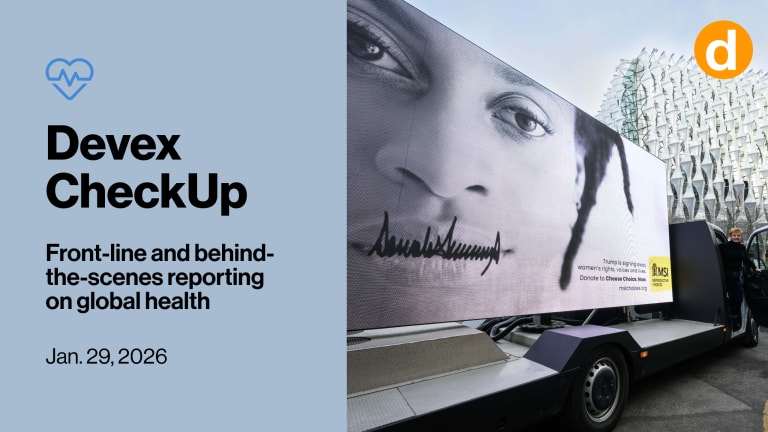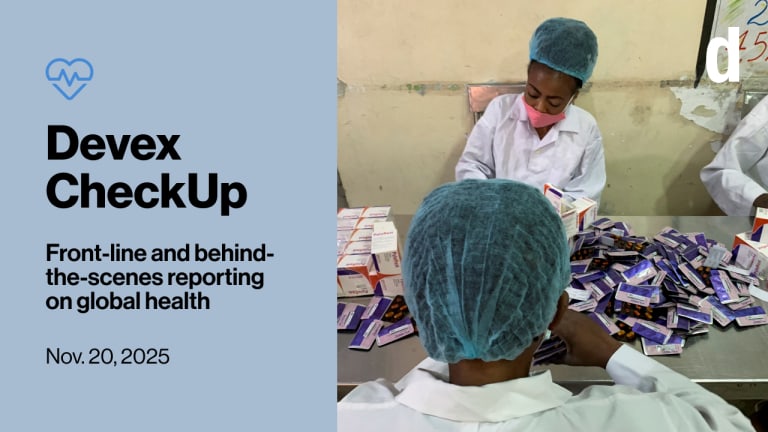
Thanks to the genomic sequencing capabilities of South Africa and Botswana, the world is now aware of a new COVID-19 “variant of concern,” omicron, which has been reported in at least 25 countries across five of the six WHO regions.
Active surveillance and swift reporting from the two nations allowed others to take precautions against the circulation of the variant — although not everyone is happy with the resulting travel bans, which Ghanaian Health Minister Kwaku Agyeman-Manu said "smack of racism and xenophobia,” echoing the complaints of many African nations that say they’ve been unjustly targeted.
• So far, there is no direct evidence that omicron is more contagious than other variants, according to WHO, and whether it poses increased risks of hospitalization is unknown. However, preliminary evidence does suggest that reinfection may be more likely with this variant.
This is a preview of Devex CheckUp
Sign up to this newsletter for exclusive global health news and insider insights, in your inbox every Thursday.
• Pfizer CEO Albert Bourla says the company has started work on a new vaccine for omicron, in case its current two-dose vaccine doesn’t work. Meanwhile, evidence indicates that current PCR and rapid antigen tests for COVID-19 will still work to detect omicron.
• Some have blamed the inequitable distribution of vaccines worldwide for omicron. But others have expressed concern that not all countries have robust genomic surveillance, which could result in a failure to immediately detect and report a new variant.
• At a special session of the World Health Assembly, South Africa’s Sibongiseni Dhlomo called for immediately lifting travel bans. The deputy health minister further said he hopes that a new legally binding international instrument on pandemic prevention preparedness and response will address such matters.
Read: US ‘not reluctant’ as WHA agrees to negotiate pandemic accord
Exclusive: Quarter of world's countries haven’t tracked COVID-19 mutations
Insect aside
As if the world needed more reasons to address climate change, new research warns that climate change-fueled drought may lead to increased yellow fever outbreaks.
At a recent meeting of the American Society of Tropical Medicine and Hygiene, researchers presented the case of an unusual 2017-2018 yellow fever outbreak in urban areas of Brazil such as São Paulo and Rio de Janeiro. The disease routinely circulates in the Amazon, but Brazil hadn’t seen an outbreak of yellow fever in any of its cities for 80 years.
The researchers mapped out the cases and found the outbreak occurred in areas experiencing severe drought. They hypothesized that forest mosquitoes flew long distances in search of water and food and then bit monkeys — particularly susceptible to yellow fever — living on the outskirts of cities. This created a chain of transmission leading to human infection.
Read: Will climate change-fueled drought spur more yellow fever outbreaks?
That’s Greek to me
We asked Devex Senior Editor Tania Karas, who is Greek (and currently working from Athens), for her thoughts on the naming of the new COVID-19 variant:
How do you feel about everyone now getting to know the Greek alphabet?
It has been highly entertaining to hear people struggle to pronounce Greek letters. I’m glad they’re becoming more known beyond their use in math problems and the U.S. fraternity/sorority world.
How is “omicron” supposed to be pronounced?
In modern Greek, the word “omicron” emphasizes the first syllable. Both o’s at the beginning and end are pronounced like the o in the American English pronunciation of “toe” or “row.” OH’-me-cron. Another way to phonetically spell it might be OH-meek-ron. As for how the ancient Greeks pronounced it, that’s up for debate!
Health check
In recent decades, the urgent need for infectious disease control has become increasingly apparent. World leaders and donors paid lip service to global health security, but COVID-19 revealed major weaknesses.
Our new special report “The State of Global Health Security” answers:
• What is the state of global health security today, and where does it go from here?
• What’s the future of WHO?
• What went wrong with pandemic preparedness measures?
• Who dropped the ball on health security funding?
Read the report for a look at what we found.
+ Go deeper with a Devex Pro subscription. Some parts of this report are available exclusively to Pro subscribers. Join today to start your 15-day free trial and enjoy access to all our in-depth global health coverage, analysis of funding from the world’s biggest donors, invite-only conversations with development leaders, and more business development resources.
Ambition vs. reality
WHO has set a goal of vaccinating 40% of each country’s population by the end of 2021. But 103 countries had yet to reach this milestone as of Monday, and more than half of these are at risk of missing the target. The main reason? A lack of access to vaccines, according to WHO Director-General Tedros Adhanom Ghebreyesus.
But other factors are also at play. In Malawi, rumors that COVID-19 vaccines affect women’s fertility are driving vaccine hesitancy, according to Madalitso Wills Kateta’s reporting for Devex. This is contributing to a low rate of full vaccination — which currently sits at just 3% of the country’s population.
Meanwhile, a modeling study predicts that Papua New Guinea, the Solomon Islands, and Vanuatu won’t reach full vaccination among 70% of their populations by mid-2022 — another target set by WHO — mainly due to vaccine hesitancy and health system capacity gaps.
But topography, demographics, and climate conditions could also affect countries’ ability to reach the 70% milestone. For instance, people over 18 years of age account for just 54% of Ethiopia’s population. In fact, people younger than 15 — who are often not yet eligible for vaccination — account for more than 40% of the population in a majority of low-income countries.
Read: Will countries reach the 70% vaccination target by mid-2022?
Did you know? “Vaccine” is Merriam-Webster’s 2021 word of the year. Searches for the word increased by 601% from 2020 and 1,048% from 2019. Similarly, “vax” was Oxford Languages’ 2021 word of the year.
What we’re reading
Gayle Smith is returning to the ONE Campaign after eight months as the United States global COVID-19 response coordinator. [Reuters]
Greece has made COVID-19 vaccinations mandatory for people ages 60 and older, with penalties for those failing to get a first shot by mid-January. [The New York Times]
GlaxoSmithKline aims to develop an HIV cure by 2030. [Bloomberg]










